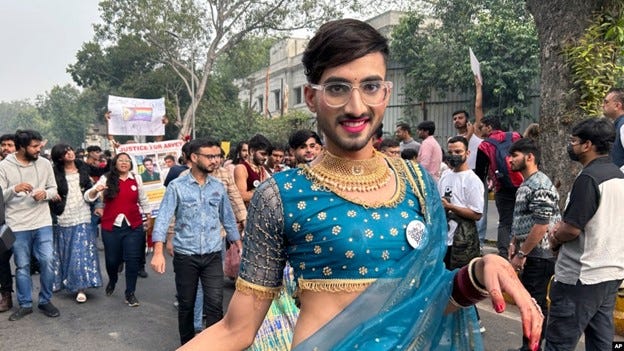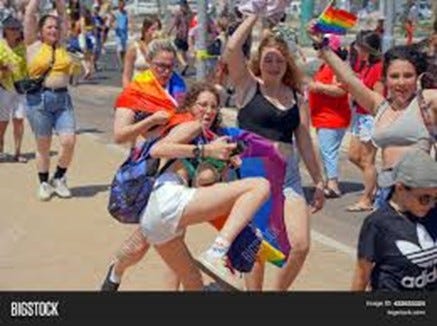“We’re here! We’re queer! Get used to it!”[1] – Or Not.
Introduction
Queer means odd or eccentric – even twisted, and it has its roots in the 1500s Brunswick dialect of the Scotch. By the 1700s it had also a sense of feeling, behaving or appearing abnormal, and in the 1900s queer was applied to those who had homoerotic inclinations or even practiced homo-libidinal behaviour. Theresa de Laurentis, a film theorist, is attributed the peculiar honour of having coined the term “queer theory” in February 1990. Hers was a call to rebellion, with a claim that deviance should be normalised - and non-“normative” venereal behaviour was deemed transformational and to be celebrated.
Un-theory
Many queer theorists refuse to acknowledge queer theory as a theory, and in general the definition of “queer” as they promote it is intentionally maintained free of definition so that an entire spectrum of deviance, disorder and perversion may be included - and new ones added as they appear from the depths. Queer theory, while frequently denying it, seeks to identify identity groups that could be labelled as discriminated, and it predominantly promotes a legion of sodomic practices and a haunt of self-identities or “genders” primarily centred on sex but extending beyond the combinations and permutations of male and female. Further identities become possible when sex-related and sodomy-related identities become combined. An additional focus is the intersectionalisation of libidinity with ethnicity, socio-economic class and felt “gender” – which is to be understood as a feeling you have about whether you are a man, a woman, neither, both, some mixture or something entirely unrelated, at least at the present time.
Gender-queerness is an insurgency against all restrictions of identity, behaviour, and venereal practices. Practitioners and ideologues of the genderqueer concept claim a right to present as any gender or anything else and to change identity at any time and have venereal relations with persons of either sex or with any animal or thing.
Constructionism
Queer theorists are subject to the ideas of socio-cultural constructionism, which purports that there is no truth or reality but that the environmental and temporal situation influences and provides meaning to be commonly accepted and believed. One’s identity as one feels, expresses and identifies oneself, based often on the intersectional criteria are also claimed to be changeable, and identity itself is believed to be constructed. Indeed it would have been impossible to proceed with the rebellion of pride and concupiscence, and with the assault on nature and truth, if queer theory did not encompass the anti-realist theory of constructionism.
Queer theory suggests then that sex is constructed and that felt “gender” and expressed “gender” are constructed – so that the construction is real and reality thereby is false. Such thinking allows an adult male to identify as a woman or a baby or a horse – or an androgynous foal that lusts for zebras. Once this is accepted, then not only does male and female not have ground to stand on, but norms such as the joining of man and woman to form a family, and institutions such as marriage also become ungrounded – and unreal. When in consequence, norms have no basis, then even queerness and deviance lose their meanings: where norms are not real – then there is nothing to deviate from. It is not thought inconsistent that when the bulwarks of society have been pulled down, that then the queer becomes the norm - albeit a norm of brimstone and fire, perhaps to be rebelled against, to bring a return to sanity.
Sodomite philosopher Michel Foucault was of the view that the joining in love and commitment between man and bride thus forming a family fulfilled by children was a “historical construct” and not the real foundation of society and civilisation. Radical feminist and legally non-binary lesbian Judith Butler who prefers the pronouns they/them and who lives with a lesbian - and they even legally have a son in California, is of the view that sex is not a biological reality where a man is a man and a woman is a woman, but is a social construct that happens by performing activities. That is if a man is wearing dresses and lipstick every day and the day after, he is performatively a genderal woman, irrespective of his Y chromosome and prostate gland.
Mission
According to Kristen Barber and Danielle Hidalgo, queer academics are supposed to explore and challenge the occurrence in society, art, activism, media and academia of people understood to be men and women, and of sexual relations understood as being between men and women in marriage and open to child-bearing. The goal of queer activism is to undo hierarchies, destroy binaries and fight any suggestion that every type of deviance and sodomy is unequal to virtuous and chaste courtship, marriage and the natural family. Indeed queer theory does not propose any particular identity or behaviour, but merely exists to breakdown tradition and annihilate normalcy - and proliferate disorder, perversion, lies and confusion.
Transgender activist Riki Williams states that “gender is the new frontier – the place to rebel, to create new identities and uniqueness, to defy old tired dated social norms” and to defy all authority. Marxism is not absent in queer thinking since it is believed that knowledge, truth and social structures are shaped by Foucault’s power dynamics – and power is exerted by the “oppressor’ upon the “marginalised”. It is this alleged power of man and woman, of marriage and virtue that needs to be overthrown by the queer revolution that will transform societies and nations.
Doom
Queer theory in all its forms is a denial of the nature of the human being and the reality of sexual difference – and a rebellion against virtue, wisdom and nature. And yet, anyone who will not be bullied by these theorists and their disciples will be called “homophobes” or bigots – and once law and policy are enacted sanctioning these ideas, the bigots will become biased, discriminating criminals. One need not go beyond policy documents prepared by UN organisations for execution in Sri Lanka, the manifesto of the NPP, the sensitisation programs in government institutes, the ESG in corporate offices and the statements of the new Prime Minister to understand that sunny Sri Lanka of smiling islanders is queering fast. The question is – will you ride the wave and drown, or stand up and speak up for truth and virtue.
[1] Protest chant of LGBTQ activist group Queer Nation.





